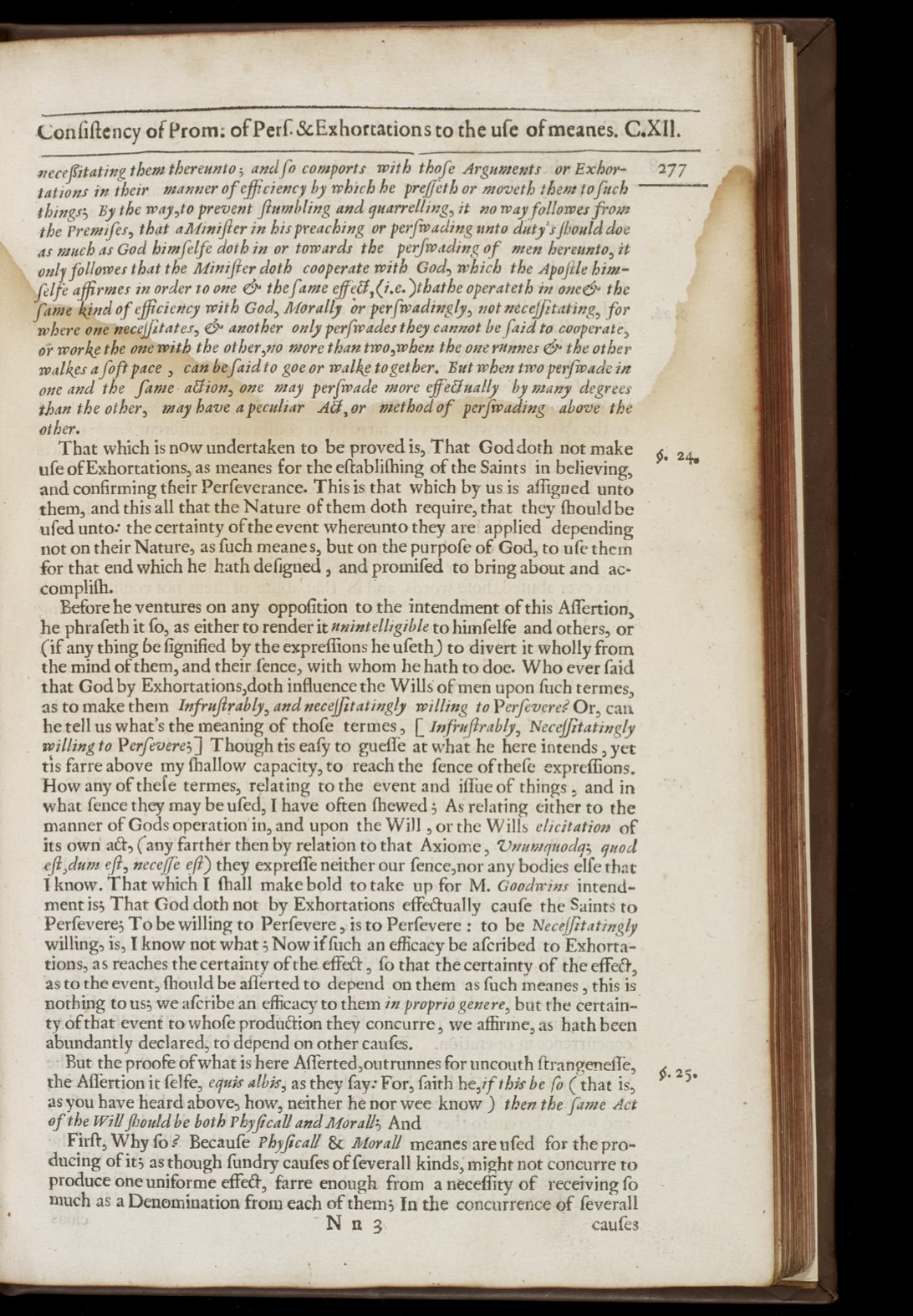

Conhfency
of
Prom: ofPerf. &Exhortations
to
the
ufe
ofmeanes.
C.X11.
neceftitating them thereunto
;
and
fo
comports
with
thofe Arguments.
orExhor-
277
tations in their
manner
of
efficiency
by
which
he preffeth
or moveth them
tofuch
things;
Ey
the way,to
prevent
Humbling
and
quarrelling,
it
no way
followes
from
the
Premifes,
that
aMinifler
in
hispreaching
or
perfwading
unto
duty'sfbould
doe
as
touch as God
himfelfe
cloth
in
or towards
the perfwading
of
men hereunto,
it
only
follower
that
the
Minifier
doth
cooperate
with
God, which the
Apoftle
him
-
felfe
a
f
firmes in
order
to
one
&
the
fame
eff
ell,(i.e. )thathe
operateth
in one&
the
fame kind
of
efficiency
with
God,
Morally or perfwadingly, notsreceffrtating,
for
where
one
neceffitates,
&
another
only
perfwades they
cannot
be
faid
to
cooperate,
or worke the
one
with
the other,no
more
than
two,when the
one
mines
&
the
other
walkes a
fo
ft
pace
,
can
befaid
to
goe
or
walke
together.
Eut
when two
perfwade
in
one
and the
fame
ablion,
one may
perfwade
more
eff
eelualty
by
many
degrees
than the other,
may
have
a
peculiar Ate, or method
of
perfwading
above
the
other.
That
which
is
now undertaken
to
be
proved
is,
That
Goddoth
not
make
4.
ufe
of
Exhortations,
as
meanes
for the
eftablifhing
of
the
Saints in
believing,
and
confirming
their
Perfeverance.
This
is
that
which by us
is
affigned
unto
them,
and this
all
that the Nature
of them doth require,
that
they fhould
be
ufed
unto: the
certainty
ofthe
event whereunto
they are applied depending
not
on
their Nature,
as
fuch meane
s,
but
on the purpofe
of
God, to
ufe
them
for that
end
which
he
hath
defigned ,
and
promifed
to
bring
about and
ac-
compli(h.
Before
he ventures on any oppofition
to
the intendment
of
this
Affertion,
he
phrafeth it
fo, as
either
to renderit
unintelligible
to
himfelfe
and others,
or
(if
any
thing
be
fignified
by the
expreffìons
he
ufeth) to divert
it wholly from
the mind
of
them, and their
fence,
with whom he hath
to
doe.
Who
ever faid
that
God
by
Exhortations,doth
influence
the
Wills
of
men upon
fuch
termes,
as
to
make
them
Infruflrably, and
neceJtatingly
willing
to
Perfevere?
Or,
can
he
tell
us
what's
the
meaning
of
thofe
termes,
[7n
fruflrably, Neceffitatingly
willing
to
Perfevere;]
Though
tis eafy
to
gueffe
at what he here intends
,
yet
tis farre
above my (hallow capacity,
to
reach
the
fence
of
there expreffions.
How
any
of
thefe termes, relating
to
the event and
iffue
of
things,
and in
what
fence
they
may be ufed,
I
have often
(hewed;
As
relating either
to
the
manner
of
Gods
operation
in, and upon
the Will , or the
Wills elicitation
of
its
own
a&,
(any
farther then by relation
to
that
Axiome,
Vnunaquodq;
quad
eft;dum
eft,
neceffe
eft)
they
expreffe
neither our fence,nor
any bodies
elfe
that
I know.
That
which I (hall
make bold to
take up
for
M. Goodwin:
intend-
ment
is;
That
God
doth
not by Exhortations
effe&ually caufe
the
Saints
to
Perfevere;
To
be
willing
to
Perfevere,
is
to
Perfevere
:
to be
Nece
ftatingly
willing,
is,
I know not
what;
Now
if
fuch an
efficacy
be afcribed
to Exhorta-
tions,
as reaches
the certainty
of
the
effe&,
fo
that the certainty
of
the
effe&,
as
to the
event, fhouldbe afferted
to
depend on them
as
fuch
meaner
,
this
is
nothing
to
us;
we
afcribe an
efficacy
to them
in
propriogenere,
but the
certain -
ty.ofthat
event
to
whofe
proddlion
they
concurre,
we
affirme,
as
bath
been
abundantly declared; tó depend
on
other
caufes.
But
the proofe
of
what
is
here Afferted,outrunnes for uncouth ftrangeneffe,
25.
the
Affertion
it
felfe,
quid' albis, as
they fay:
For,
faith
he,if
this
be
/o
(that
is,
as
you have
heard
above,
how, neither he
nor
wee
know)
then the
fame
Act
of
the Willfhould
be
both
Phyficall
and
Morall; And
FrÍ'r, Why
fo?
Becaufe
Phyficall
& Moral/ meanes are ufed for
the pro-
ducing
of it;
as
though fundry
caufes
of
feverall
kinds, might not concurre
to
produce one uniforme
effe&,
farre enough from
a neceffity
of
receiving
fo
much
as a
Denomination from
each
of
them;
In
the
concurrence
of
feverall
N
n
3
>
caufes










